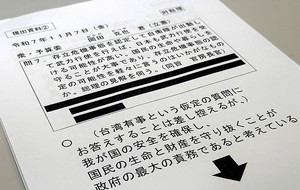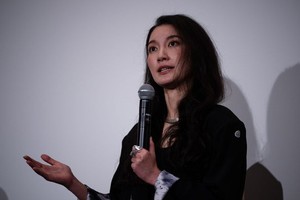THE ASAHI SHIMBUN
November 8, 2022 at 18:18 JST
 Prime Minister Fumio Kishida, center, heads to his office on Nov. 8. (Koichi Ueda)
Prime Minister Fumio Kishida, center, heads to his office on Nov. 8. (Koichi Ueda)
Prime Minister Fumio Kishida on Nov. 8 announced his intention to submit legislation to the current Diet session to ban religious organizations from making egregious demands for donations.
Before making the announcement, Kishida met with Natsuo Yamaguchi, head of junior coalition partner Komeito, and told him of his intention to submit the bill.
Kishida said an agreement was reached to include in the legislation provisions to ban egregious attempts to gain donations and to make it possible to rescind donations and provide compensation to victims.
He also revealed that he had met with some of those victimized by the Unification Church.
“As a politician, my heart went out to them after hearing about their dreadful experiences,” Kishida said. “I became determined to work at a faster pace on new legislation covering a wider range of damage so the government as a whole can help the victims and prevent a recurrence.”
The Kishida administration had initially considered only revising the Consumer Contract Law to ease conditions for rescinding contracts related to so-called spiritual sales of the Unification Church.
Kishida and his government have faced harsh criticism over the close ties between lawmakers of the ruling Liberal Democratic Party and the Unification Church, which is now formally called the Family Federation for World Peace and Unification.
An advisory panel to the Consumer Affairs Agency released recommendations for dealing with the huge donations and dodgy sales practices of the Unification Church.
One suggestion was to refer to the public interest corporation law in defining what donation solicitation acts to ban.
Officials of the LDP and Komeito have been meeting with their counterparts from the opposition Constitutional Democratic Party of Japan and Nippon Ishin (Japan Innovation Party) to hammer out legislation to help victims of the Unification Church.
The opposition parties have asked for provisions to allow family members to act on behalf of members to rescind contracts and to ban large donations made while members were under the mind control of the church.
But the ruling coalition has been more cautious, citing potential violations of the Constitution’s protection of freedom of religion.




















A peek through the music industry’s curtain at the producers who harnessed social media to help their idols go global.
A series based on diplomatic documents declassified by Japan’s Foreign Ministry
Here is a collection of first-hand accounts by “hibakusha” atomic bomb survivors.
Cooking experts, chefs and others involved in the field of food introduce their special recipes intertwined with their paths in life.
A series about Japanese-Americans and their memories of World War II